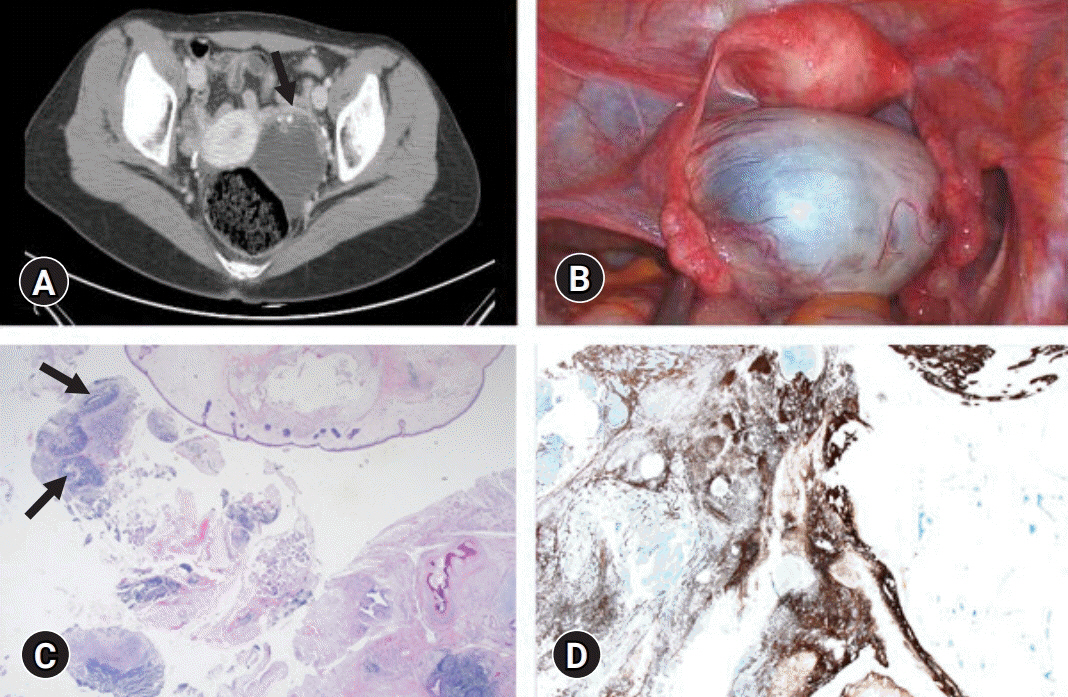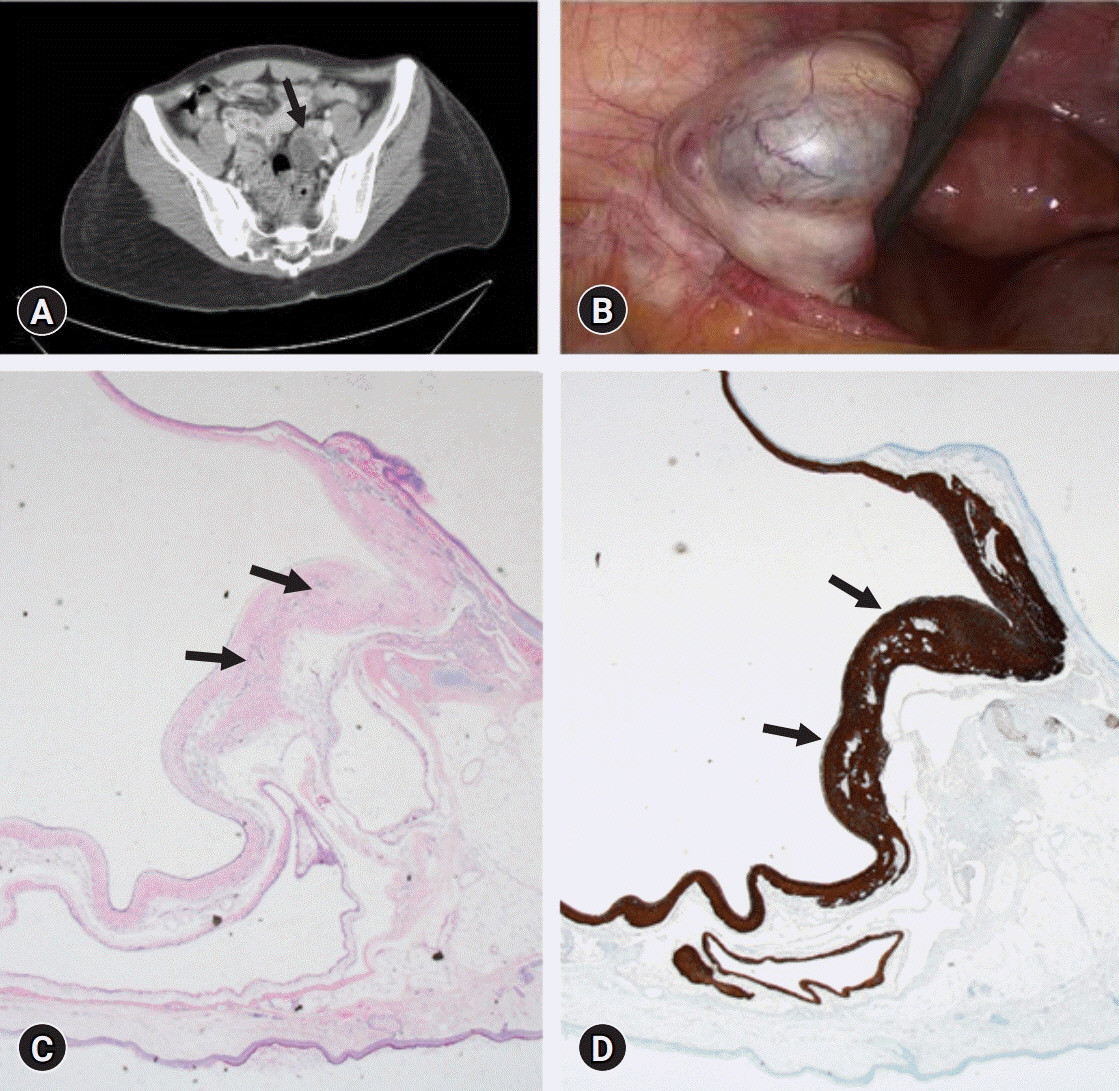Yeungnam Univ J Med.
2021 Oct;38(4):350-355. 10.12701/yujm.2020.00794.
Anti-N-methyl-D-aspartate receptor encephalitis associated with ovarian teratoma in Korea: three case reports
- Affiliations
-
- 1Department of Obstetrics and Gynecology, Kyungpook National University Hospital, School of Medicine, Kyungpook National University, Daegu, Korea
- 2Department of Obstetrics and Gynecology, Ajou University School of Medicine, Suwon, Korea
- 3Department of Pathology, Ajou University School of Medicine, Suwon, Korea
- 4Gynecologic Cancer Center and Department of Obstetrics and Gynecology, Ajou University School of Medicine, Suwon, Korea
- KMID: 2521715
- DOI: http://doi.org/10.12701/yujm.2020.00794
Abstract
- Anti-N-methyl-D-aspartate receptor (NMDAR) encephalitis is a severe autoimmune paraneoplastic syndrome associated with ovarian teratomas. Most patients develop neurologic symptoms, including psychosis, memory deficits, seizures, or abnormal movements, and experience abdominal pain related to ovarian neoplasm. We present a case report of three patients diagnosed with anti-NMDAR encephalitis accompanied by ovarian teratomas at Ajou University Hospital in Korea. The patients demonstrated a different clinical course of the disease. However, upon diagnosis, all patients underwent surgical removal of the ovarian teratoma followed by intensive immunotherapy. The symptoms progressively improved following treatment. This is a case report of a rare autoimmune anti-NMDAR encephalitis associated with ovarian neoplasms, including immature teratoma.
Keyword
Figure
Reference
-
References
1. Braverman JA, Marcus C, Garg R. Anti-NMDA-receptor encephalitis: a neuropsychiatric syndrome associated with ovarian teratoma. Gynecol Oncol Rep. 2015; 14:1–3.
Article2. Dalmau J, Lancaster E, Martinez-Hernandez E, Rosenfeld MR, Balice-Gordon R. Clinical experience and laboratory investigations in patients with anti-NMDAR encephalitis. Lancet Neurol. 2011; 10:63–74.
Article3. Irani SR, Bera K, Waters P, Zuliani L, Maxwell S, Zandi MS, et al. N-methyl-D-aspartate antibody encephalitis: temporal progression of clinical and paraclinical observations in a predominantly non-paraneoplastic disorder of both sexes. Brain. 2010; 133:1655–67.
Article4. Dalmau J, Gleichman AJ, Hughes EG, Rossi JE, Peng X, Lai M, et al. Anti-NMDA-receptor encephalitis: case series and analysis of the effects of antibodies. Lancet Neurol. 2008; 7:1091–8.
Article5. Dalmau J, Tüzün E, Wu HY, Masjuan J, Rossi JE, Voloschin A, et al. Paraneoplastic anti-N-methyl-D-aspartate receptor encephalitis associated with ovarian teratoma. Ann Neurol. 2007; 61:25–36.
Article6. Yang YW, Tsai CH, Chang FC, Lu MK, Chiu PY. Reversible paraneoplastic limbic encephalitis caused by a benign ovarian teratoma: report of a case and review of literatures. J Neurooncol. 2006; 80:309–12.
Article7. Kemp JA, McKernan RM. NMDA receptor pathways as drug targets. Nat Neurosci. 2002; 5(Suppl):1039–42.
Article8. Vitaliani R, Mason W, Ances B, Zwerdling T, Jiang Z, Dalmau J. Paraneoplastic encephalitis, psychiatric symptoms, and hypoventilation in ovarian teratoma. Ann Neurol. 2005; 58:594–604.
Article9. Florance NR, Davis RL, Lam C, Szperka C, Zhou L, Ahmad S, et al. Anti-N-methyl-D-aspartate receptor (NMDAR) encephalitis in children and adolescents. Ann Neurol. 2009; 66:11–8.
Article10. Zakhour M, Axtell AE, Lentz SE. Anti-NMDA receptor encephalitis: consider the ovaries. Gynecol Oncol. 2015; 137(Suppl 1):105.
Article11. Medepalli K, Lee CM, Benninger LA, Elwing JM. Psychosis: call a surgeon? A rare etiology of psychosis requiring resection. SAGE Open Med Case Rep. 2016; 4:2050313X16670084.
Article12. Zhang L, Lu Y, Xu L, Liu L, Wu X, Zhang Y, et al. Anti-N-methyl-D-aspartate receptor encephalitis with accompanying ovarian teratoma in female patients from East China: clinical features, treatment, and prognostic outcomes. Seizure. 2020; 75:55–62.
Article13. Lee CH, Kim EJ, Lee MH, Yim GW, Kim KJ, Kim KK, et al. Anti-N-methyl-D-aspartate receptor encephalitis: a rare complication of ovarian teratoma. J Korean Med Sci. 2020; 35:e207.
Article
- Full Text Links
- Actions
-
Cited
- CITED
-
- Close
- Share
- Similar articles
-
- Ovarian teratoma associated anti-N-methyl-D-aspartate receptor encephalitis presenting abnormal behavior
- Case of anti-N-methyl D-aspartate receptor encephalitis associated with ovarian teratoma presenting as suicidal ideation
- Anti-N-methyl-D-aspartate Receptor Encephalitis Caused by a Mature Mediastinal Teratoma
- Anti-N-Methyl-D-Aspartate Receptor Encephalitis with Ovarian Teratoma Improved by Prompt Surgery
- Anesthesia for ovarian teratoma resection using remimazolam and remifentanil in a patient with anti-N-methyl-D-aspartate receptor encephalitis -two case reports-




